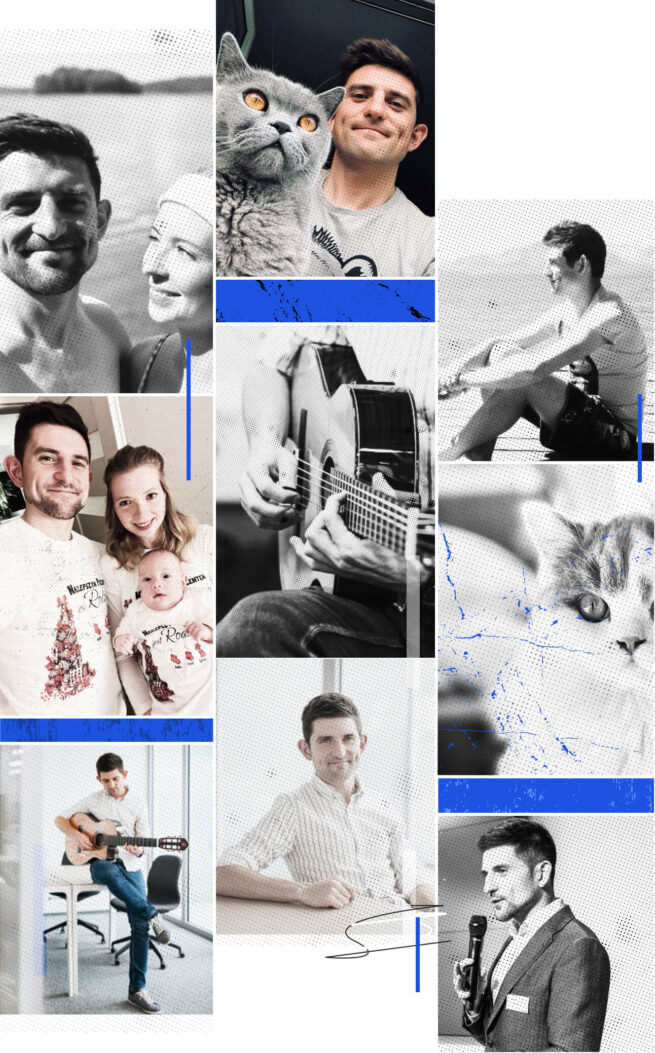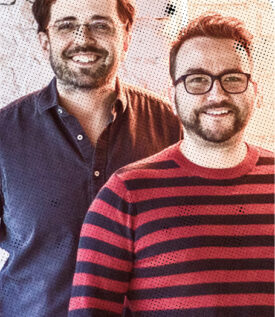Piotr.
Founder and CEO of Infermedica – a company whose mission is to increase the availability of medical care for people around the world and reduce the risk of misdiagnosis as well as the cost of providing medical services.
Graduate of the University of Science & Technology in Wrocław. He has experience in the IT world as a computer game programmer. In his spare time, he indulges in tennis and playing the guitar.
Piotr
Personal development
-
2012
Company is formed. 200,000 virtual diagnoses are made in the first year of operation.
-
2018
Wins first place in the startup competition at the HIMSS Europe & Health 2.0 Conference 2018 in Barcelona.
-
2019
Raises USD 3.65 million in the Late Seed Round. Apart from Estonian company, Karma Ventures, and Polish company, Inovo Venture Partners, other round investors also include: American company, DreamIT Ventures, and the German media group, Müller Medien.
-
2020
Raises USD 10.25 million during Series A. Round investors include the European Bank for Reconstruction and Development and Germany’s Heal Capital Fund. Previous investors include: Karma Ventures, Inovo Venture Partners, and DreamIT Ventures.
-
2022
Raises USD 30 million during Series B. One Peak Partners, specializing in tech companies, decides to invest in Infermedica.
Read more about Infermedica:
The history of Infermedica
How it started
Before Infermedica, I used to write mobile games for operating systems that probably no longer exist and I studied Computer Science and Management at Wrocław University of Technology.
In 2012, I came across the game “20 Questions” (Akinator). I played it with Ania, a friend who is a doctor. The goal of the game was to guess the character that we were each thinking of in 20 questions. We thought this was a pretty cool concept and asked ourselves, “What if we adapted this concept to something that could also help and benefit people?” – so we turned the characters into diseases. Ania started building a medical database, I programmed everything, and that’s how we created a working prototype of Infermedica, by simply asking questions about disease symptoms.
Getting initial funding and launching the project
The beginning was not easy as it was difficult for us to get any funding. In the end, Wrocław Research Center EIT + invested PLN 450,000, but it quickly turned out that this was not enough, and the money ran out after a year.
In September 2012, we launched the Doktor-Medi website. We had a prototype and thought that the interest would be huge, but life quickly brought us back to reality – initial user interest started to decline, and we had no idea how to monetize the product.
That was when we decided to hire a salesperson with experience… selling clothes. After a month of working with him, we sold two subscriptions. One doctor bought it because he felt sorry for us. The other one bought it by mistake. B2C was not the path for us.
Tough moments and a light at the end of the tunnel
At some point, we started to run out of funds. There were times when I had to use my credit card to pay employee wages.
Fortunately, EIT + put us in touch with an investor who was interested in us: Piotr Wilam from Innovation Nest. We joined their startup program and they started to mentor us. We flew to Silicon Valley to gather feedback. Sitting on the plane, I remember thinking that Silicon Valley and California were both just cities. I was very surprised once I got there.
During my stay, I was contacted by someone from a large American company who said, “Peter, if you had the API, we could buy it from you. This would enrich our product for hospitals.” This sounded like a dream come true. We signed a contract, built an API and started looking for more companies that would like to license our technology. That was when we switched to the B2B model that we still use today.
Two years after that, we almost sold the company. I got an email from a company in Germany that was interested in buying Infermedica. We took it under serious consideration, but after several long talks, we came to the conclusion that we did not want to sell. That was in 2015.
Crisis and attracting investors
During the company’s biggest crisis, I used the last of my money to fly to the US and think about how to handle the situation.
In San Francisco, I organized my first healthtech meetup. I persuaded medical companies to lend their premises and they even bought pizzas and drinks for guests. Over a hundred people came. When I returned to Poland, we found other people to organize meetups. It sounds unreal today, but that’s how it went down.
After returning to Poland, the tide turned in our favor. A client wrote me an email, and we signed a contract for half a million dollars. Suddenly, we went from being in the red one day, to having PLN 1.8 million in our account the next. We felt like kings.
It was also the moment when VTI bought shares from EIT + and foreign funds started to take an interest in us. Karma and Inovo also believed in Infermedica – this was when we really started to gain momentum and noticed how big our shortcomings were.
"For me, the most important thing is transparency. Whether things are going well or not, you have to say what you think. This helps everybody avoid misunderstandings."
The worst moment in our cooperation
It was during a meeting about a delicate matter. We came to the meeting very relaxed while unfold.vc showed up with a lawyer, who told us that we should just talk and discuss things as usual, as if they were not at the table with us. Back then we couldn’t afford a lawyer. It was a very unpleasant experience, showing that unfold.vc didn’t trust us.
unfold.vc: Since then, we have not appeared at the meetings with a lawyer.
Features of a good leader
I believe charisma and the “go-getter” attitude to be overestimated.
Many associate leadership with the main character from the film, Wolf of Wall Street, when in reality these individuals are rarely very successful, and if they are, this is achieved at a great cost – usually at the expense of others.
Honesty and sincerity, on the other hand, are underestimated. For me, the most important thing is transparency. Whether things are going well or not, you have to say what you think. This helps everybody avoid misunderstandings.
First employee
Pawel. He’s still working with us. He’s the CTO.
Least favorite words in business
In business, the words that I like the least are “boss” and “subordinates”. I can’t believe there are people who still use these terms.
Sukces? Nie do końca
I find that it is too easy for us to get excited about success, as it is rarely the result of one specific decision. Success is largely the work of chance. We were very lucky and I hope that we will continue to win.
My philosophy
The rule I try to live by is: “nothing is ever as good or as bad as it seems“. (Scott Galloway)
Personal development
-
2012
Company is formed. 200,000 virtual diagnoses are made in the first year of operation.
-
2018
Wins first place in the startup competition at the HIMSS Europe & Health 2.0 Conference 2018 in Barcelona.
-
2019
Raises USD 3.65 million in the Late Seed Round. Apart from Estonian company, Karma Ventures, and Polish company, Inovo Venture Partners, other round investors also include: American company, DreamIT Ventures, and the German media group, Müller Medien.
-
2020
Raises USD 10.25 million during Series A. Round investors include the European Bank for Reconstruction and Development and Germany’s Heal Capital Fund. Previous investors include: Karma Ventures, Inovo Venture Partners, and DreamIT Ventures.
-
2022
Raises USD 30 million during Series B. One Peak Partners, specializing in tech companies, decides to invest in Infermedica.
